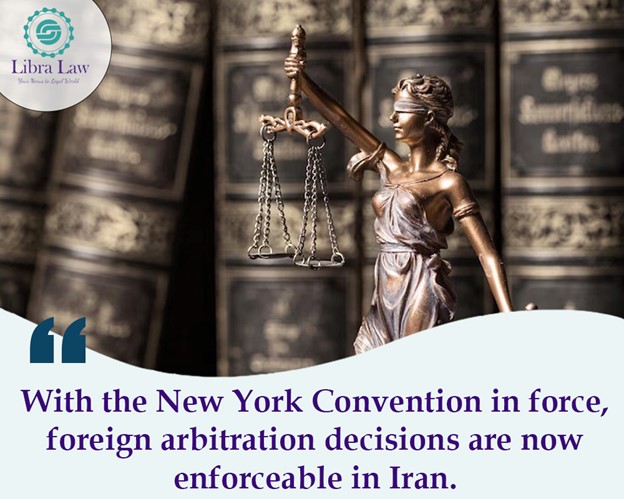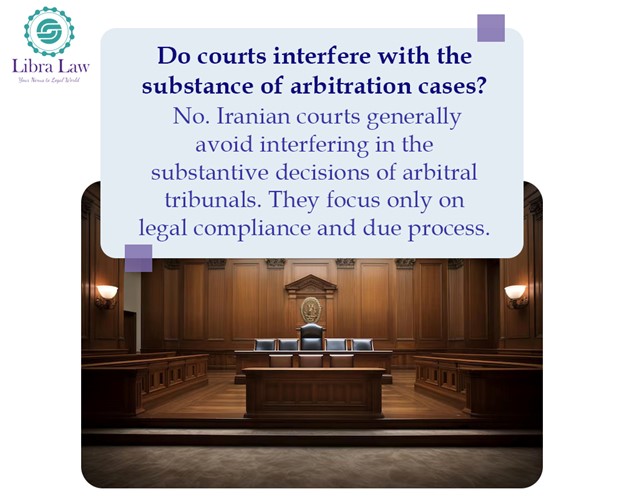Key Legal and Institutional Insights into Arbitration in Iran for International Business Deals are more relevant than ever for companies involved in international trade and navigating cross-border transactions. In today’s fast-moving global marketplace, disputes are inevitable; but how you resolve them can make all the difference. For business owners navigating cross-border transactions with Iranian counterparts, understanding the legal mechanisms available for resolving commercial conflicts is not just an option; it’s a competitive necessity.
If you want to learn more about common legal mistakes businesses make and how to avoid them, be sure to check out the article «Top Legal Mistakes Businesses Make and How a Law Firm Can Help You Avoid Them».
At LibraLaw, our legal experts specialize in international commercial arbitration and are uniquely positioned to guide you through Iran’s evolving arbitration landscape. In this article, we break down what every business owner should know about arbitration in Iran — from its legal foundations to the role of Iranian courts and the benefits of choosing institutional arbitration through bodies like the Arbitration Center of the Iran Chamber (ACIC).
Whether you’re a multinational investor, a regional partner or a local enterprise expanding internationally, this insight could directly impact how you protect your interests, enforce your contracts and secure successful business outcomes. Let’s explore the key legal and institutional aspects that could shape your next major commercial decision.
For more detailed information about how commercial arbitration works and why it’s crucial for international business, be sure to check out the article «Key Insights into Commercial Arbitration Every Business Owner Should Know».
Is Iran the New Frontier for International Arbitration? Discover Why Global Businesses Are Paying Attention
Arbitration in Iran has become a key method for resolving international business disputes. With its growing importance in global trade, businesses are increasingly recognizing arbitration as a preferred alternative to traditional litigation. Let’s break down why arbitration has become essential for businesses, particularly when dealing with international commercial disputes in Iran:
1. Advantages of Arbitration Over Litigation

Arbitration provides numerous benefits over litigation in national courts. It is recognized for its ability to offer faster, more efficient, and flexible resolution of disputes. Unlike court proceedings, which can take years to resolve, arbitration typically provides a much quicker resolution. In addition, arbitration allows for more flexibility in terms of the process itself. Parties can choose their own rules, set timelines and agree on the scope of the dispute.
This flexibility and speed are especially important in international business, where delays can lead to significant financial losses. For instance, in international trade, an Iranian exporter and a European importer may choose arbitration to resolve any contractual dispute, ensuring that it is settled quickly and without the drawn-out delays common in national courts.
2. Confidentiality and Protection of Sensitive Information
Confidentiality is one of the main reasons why businesses prefer arbitration, especially in industries that deal with sensitive information such as pharmaceuticals, technology or trade secrets. Unlike court trials, which are usually public, arbitration proceedings are private, allowing the parties to resolve their issues without disclosing proprietary information.
In a dispute between two pharmaceutical companies over a licensing agreement, for example, keeping trade secrets and market strategies confidential through arbitration is essential. In Iran, arbitration rules enforced by institutions like the Arbitration Center of the Iran Chamber (ACIC) emphasize the confidentiality of proceedings, making it a secure option for businesses involved in sensitive matters.
3. Neutrality in Dispute Resolution

One of the most significant advantages of arbitration is its neutrality. When businesses from different countries are involved, neither party usually wants to submit their dispute to the other’s national courts. Arbitration offers the option of selecting neutral arbitrators and a neutral forum, ensuring fairness and impartiality.
For example, in a dispute between an Iranian construction company and a Turkish subcontractor, both parties might agree to appoint independent arbitrators and choose Geneva as the location for arbitration. This ensures that neither party has an advantage, fostering trust and confidence in the resolution process; This neutrality is crucial in international business, where perceived bias can harm long-term relationships.
4. Enforceability of Arbitration Awards
Arbitration awards are generally more easily enforceable internationally than court judgments; This is thanks to the 1958 New York Convention, which Iran is a signatory to. The Convention allows arbitration awards to be recognized and enforced in over 165 countries, making arbitration a preferred dispute resolution mechanism for international businesses.
For instance, if an Iranian company resolves a dispute with a European partner through arbitration, the award can be enforced in the partner’s home country. In contrast, a court judgment issued in Iran may face challenges when it comes to enforcement abroad, due to differing legal systems and enforcement issues.
5. Legal Framework and Institutional Support in Iran
In Iran, arbitration is not a new concept. It is well-established under national legislation. The Iranian Code of Civil Procedure (Articles 454 to 501) provides the legal foundation for domestic arbitration, while the International Commercial Arbitration Act, which mirrors the UNCITRAL Model Law, aligns Iran’s arbitration laws with international standards.
This solid legal framework makes arbitration in Iran both reliable and attractive to foreign businesses. Additionally, institutions like the Arbitration Center of the Iran Chamber (ACIC) are actively working to improve and promote arbitration as a credible method of dispute resolution; This institutional support helps ensure that businesses can rely on a robust and professional arbitration process in Iran.
6. Increased Foreign Investment and Cross-Border Transactions

The growth of foreign investment and cross-border transactions in Iran has also contributed to the rise of arbitration as a dispute resolution mechanism. As businesses from around the world engage in joint ventures, trade agreements and investment projects in Iran, the need for a neutral, reliable method of resolving disputes becomes more critical.
If you want to learn more about entering the Iranian market and choosing the right legal structure for foreign investment, check out our article, «A Simple Guide to Entering the Iranian Market; Choosing the Right Legal Structure for Foreign Investment».
Arbitration provides a viable solution for resolving issues between foreign investors and Iranian companies, offering them a platform where both parties can ensure fair treatment; This, in turn, enhances the business climate, making Iran an increasingly attractive destination for international commerce.
As Iran continues to integrate into the global economy, arbitration has proven to be an effective and essential tool for resolving international business disputes. Whether it’s confidentiality, enforceability, neutrality or the streamlined process, arbitration offers businesses a reliable alternative to litigation.
At LibraLaw, we specialize in guiding businesses through arbitration and alternative dispute resolution processes, ensuring that disputes are handled professionally, efficiently, and cost-effectively. If you’re navigating international agreements or cross-border transactions in Iran, arbitration can safeguard your interests and provide clarity in dispute resolution.
What Legal Foundations Make Iran a Reliable Choice for Arbitration in International Trade?
Arbitration in Iran is firmly embedded within the country’s legal system and offers a well-defined, statutory framework for both domestic and international dispute resolution. The legal foundations of arbitration in Iran consist of several key elements that ensure its legitimacy and efficiency; These include:
1. Articles 454 to 501 of the Iranian Code of Civil Procedure; Legal Basis for Domestic Arbitration
These provisions establish the legal framework for domestic arbitration in Iran; They outline the detailed procedures for creating arbitration agreements, appointing and replacing arbitrators, issuing arbitral awards and the limited instances where the court may intervene in the arbitration process.
- Article 454 defines arbitration as an agreement between two or more parties to resolve disputes outside the court system, emphasizing its role as a private and efficient dispute resolution mechanism.
- Articles 458 and 459 detail the procedures for selecting arbitrators, including mechanisms for replacing them if a party fails to cooperate.
These statutory provisions ensure that arbitration is not an informal alternative to litigation; rather, it is a legally recognized process with clear procedural safeguards under Iranian law. This offers businesses and investors confidence that arbitration in Iran is a legitimate, enforceable and structured method for resolving disputes.
2. Aligning with International Standards; The International Commercial Arbitration Act (1997)

In 1997, Iran passed the International Commercial Arbitration Act (ICAA), a pivotal piece of legislation that further integrates Iran’s arbitration practices with global standards. The ICAA closely mirrors the UNCITRAL Model Law, which is a globally recognized framework for international arbitration laws.
Key provisions of the ICAA include:
- Allowing parties to select foreign or international arbitral rules, providing flexibility in choosing how disputes will be resolved;
- Permitting the appointment of foreign arbitrators, ensuring impartiality and expertise in resolving disputes, especially in international matters;
- Providing for the recognition and enforcement of foreign arbitral awards under the New York Convention, which Iran ratified, facilitating the international enforceability of awards made in Iran.
The ICAA is applied to disputes involving at least one foreign party or when the commercial relationship is international. For instance, if an Iranian company enters into a contract with a South Korean electronics manufacturer, the ICAA enables the parties to resolve disputes through internationally accepted arbitration procedures — whether under rules such as those of the International Chamber of Commerce (ICC), UNCITRAL or the Arbitration Center of the Iran Chamber (ACIC).
This law ensures that Iran’s arbitration framework is consistent with international practices, enhancing its appeal as a jurisdiction for resolving cross-border disputes and reassuring foreign investors that Iran’s legal system provides modern, reliable and globally recognized arbitration standards.
Together, these legal foundations — the Iranian Code of Civil Procedure for domestic matters and the International Commercial Arbitration Act for international cases — provide a comprehensive and reliable system for arbitration in Iran. This robust framework offers businesses, both local and foreign, the assurance that disputes can be resolved efficiently, fairly and in alignment with international standards.
Why Was the Arbitration Center of the Iran Chamber (ACIC) Created And Why Should International Businesses Care?
The Arbitration Center of the Iran Chamber (ACIC) was founded in 2002 under the Law on the Establishment of the Iran Chamber of Commerce, marking a major milestone in the development of institutional arbitration in Iran. It was the first formal body in the country dedicated to providing structured, professional arbitration services for both domestic and international commercial disputes; Its creation responded to a growing need for a reliable and standardized method of dispute resolution, especially as global trade expanded and businesses in Iran sought more efficient alternatives to traditional litigation.

The key motivations for establishing the ACIC include:
- Enhancing Trust in Arbitration
Prior to the establishment of the ACIC, businesses often faced uncertainty regarding the fairness and competence of arbitration in Iran. One of the primary goals of ACIC was to build trust in arbitration by offering a pool of trained, experienced and vetted arbitrators. These arbitrators are skilled in resolving complex commercial disputes and are committed to impartiality, which is crucial for both local and international parties involved in disputes. By ensuring that only qualified professionals are involved, ACIC helped elevate the credibility of arbitration as a reliable means of dispute resolution.
- Providing a Stable and Reliable Framework
ACIC was established to offer a clear, stable set of arbitration rules that align with global best practices; This ensures that both Iranian and foreign businesses can confidently rely on arbitration in Iran without the uncertainty often associated with ad hoc arbitration. These rules, modeled after international standards like the UNCITRAL Model Law, ensure that disputes are handled in a consistent, transparent, and fair manner, with clear procedural safeguards in place. By standardizing the arbitration process, ACIC provides businesses with the predictability they require when entering into commercial agreements, particularly those involving cross-border transactions.
- Offering Logistical and Administrative Support
The establishment of ACIC also addressed the practical challenges associated with arbitration. As an institutional body, ACIC provides vital logistical and administrative support throughout the arbitration process, such as organizing hearings, managing documents, and ensuring that the proceedings follow established timelines; This support helps simplify the arbitration process, making it easier for businesses to focus on resolving the dispute rather than dealing with procedural complexities. Additionally, this professional administration enhances the efficiency of the arbitration process, allowing for faster resolutions compared to traditional litigation.
Since its inception, the ACIC has played a crucial role in making arbitration in Iran more predictable, efficient and appealing to businesses. The establishment of this institution has helped solidify Iran’s position as a viable and reliable arbitration venue, both for domestic companies and international businesses seeking to resolve disputes with Iranian counterparts. By offering standardized processes, reliable arbitrators and full logistical support, the ACIC has created a favorable environment for foreign investment and international trade, making Iran an increasingly attractive option for arbitration.
What Makes the Arbitration Center of the Iran Chamber a Smart Choice for Cross-Border Business Disputes?

The Arbitration Center of the Iran Chamber (ACIC) offers a comprehensive and professional arbitration process, ensuring that disputes are resolved efficiently, fairly, and in line with international standards. Several distinguishing features make ACIC arbitration particularly appealing to businesses, especially those involved in cross-border transactions:
- Predefined Rules; Clear and Structured Process
The ACIC Rules are designed based on internationally accepted standards and provide a structured, predictable framework for conducting arbitration proceedings; These rules ensure that all parties are on the same page regarding how the arbitration will unfold, including timelines, procedural steps and how evidence is presented. This clarity helps reduce the uncertainty and complexity often associated with dispute resolution and provides a level of transparency that encourages businesses to engage in arbitration with confidence.
- Roster of Arbitrators; Expert Selection
ACIC provides parties with a roster of qualified arbitrators, all of whom have been carefully vetted and approved by the center; This roster includes professionals with expertise not only in law, but also in various industries, making it possible to select arbitrators who have the necessary technical knowledge to understand the nuances of the dispute.
For example, in a construction dispute, the parties can choose an arbitrator with specific experience in engineering, ensuring the resolution process is handled by someone who understands the technical aspects of the case; This specialized expertise is particularly valuable in complex commercial disputes.
- Time Limits; Expedited Resolution

One of the common concerns with traditional litigation is the potential for lengthy delays. The ACIC seeks to address this by establishing procedural timelines that help minimize unnecessary delays; These timelines provide clear guidelines for the duration of the arbitration process, ensuring that disputes are resolved in a timely manner. As a result, businesses can avoid prolonged uncertainty and proceed with their operations, knowing that their legal matters will be handled efficiently.
- Multilingual Capability; Facilitating Cross-Border Dispute Resolution
Given the international nature of many business relationships, multilingual capability is a significant advantage of ACIC arbitration. The proceedings can be conducted in Persian, English and other major languages, making it accessible to parties from diverse linguistic backgrounds; This flexibility helps bridge the language barrier in cross-border disputes, ensuring that communication and documentation can be handled smoothly, which is crucial for international businesses engaged in complex contractual relationships.
- Administrative Support; Full Case Management
From the moment a case is registered, the ACIC Secretariat provides comprehensive administrative support to manage the process; This support includes coordinating the arbitration hearings, managing documents, tracking deadlines and ensuring the parties have access to everything they need for a smooth process. Administrative assistance ensures that the arbitration proceeds efficiently and is in line with the agreed procedural rules; so businesses can focus on resolving the dispute rather than dealing with logistical challenges.
Consider a contract between an Iranian engineering firm and a German contractor, which includes an ACIC arbitration clause. If a dispute arises over delayed payments, both parties would refer the matter to ACIC. ACIC would then appoint a qualified arbitral tribunal and facilitate hearings in English, ensuring that language does not hinder the process. Furthermore, once the tribunal issues a final award, ACIC provides assistance in enforcing the award under the New York Convention, which ensures that arbitral awards are recognized and enforceable across more than 160 member states. Without institutional support from ACIC, the parties might face significant uncertainty, procedural delays, and challenges in enforcing a potential award.
The ACIC’s features — from its structured rules and roster of expert arbitrators to its multilingual capability and strong administrative support — make it an attractive option for businesses seeking an efficient and reliable method for resolving disputes; These attributes help ensure that commercial disputes, both domestic and international, are resolved in a way that is predictable, professional and in alignment with global arbitration standards.
Do Iranian Courts Respect Arbitration? What Businesses Need to Know

Iranian courts play a primarily supportive role in the arbitration process, ensuring that the arbitral process runs smoothly while intervening only in specific circumstances. The legal framework in Iran allows for some judicial involvement; but this intervention is carefully limited to maintain respect for the autonomy and independence of arbitral tribunals. Below are the main areas where Iranian courts interact with the arbitration process:
- Confirmation and Enforcement of Arbitral Awards
One of the key supportive functions of Iranian courts is the confirmation and enforcement of arbitral awards. After an arbitral tribunal renders its decision, courts are typically tasked with confirming the validity of the award; This process is usually straightforward, provided the award complies with the country’s legal requirements. Courts do not reassess the merits of the dispute or the reasoning behind the decision; they simply ensure that the arbitral award is consistent with Iranian law and public policy.
- Limited Grounds for Setting Aside Awards
While Iranian courts generally respect the arbitral process, they do retain the power to set aside an award under certain conditions; These grounds are narrow and typically include issues such as conflict with public policy or procedural irregularities, like failure to give proper notice to the parties involved.
For example, if one party was not given sufficient opportunity to present their case or if an award violated fundamental legal principles of Iran, the court may intervene to annul the decision. However, these exceptions are carefully defined, meaning courts do not have the authority to overturn an award simply; because they disagree with its outcome.
- Interim Measures and Support During the Process
Iranian courts can also assist with interim measures to preserve the status quo during arbitration, especially if such measures are necessary to protect the rights of a party before a final award is issued; This could include orders for freezing assets or securing evidence. Courts may also provide assistance in the appointment of arbitrators if the arbitration agreement does not specify how they should be selected or if the parties are unable to agree on an arbitrator.
- Judicial Deference to Arbitral Tribunals
Overall, Iranian courts tend to refrain from intervening in the substantive aspects of an arbitration case; They recognize the autonomy of arbitral tribunals and focus on ensuring that the process adheres to legal standards, rather than re-examining the facts or merits of the dispute. This judicial deference ensures that the arbitration process remains independent, efficient and less influenced by the state’s judicial system.
In summary, Iranian courts generally take a supportive role in arbitration, intervening only when necessary and within limited grounds defined by law; This approach helps maintain the integrity and autonomy of the arbitration process, offering businesses greater confidence that their disputes will be resolved fairly and efficiently. By respecting the decisions of arbitral tribunals and minimizing intervention, Iranian courts provide additional reassurance to parties engaged in arbitration, whether domestic or international.
For insights into navigating complex financial disputes in Iran and beyond, check out our article «Strategic Legal Solutions for Complex Banking and Finance Disputes».
Given the complexities and legal intricacies of arbitration in Iran, particularly in the realm of international business, consulting with specialized legal professionals is crucial. If you require expert advice or assistance, the skilled attorneys at LibraLaw, with their extensive experience in this field, are ready to offer the guidance you need. Contact us today for tailored legal support. We’re here to help you navigate the process with confidence.









